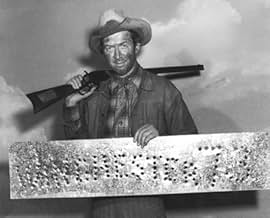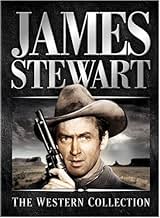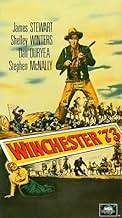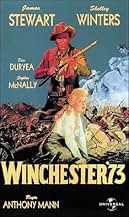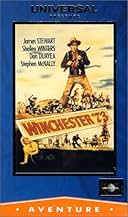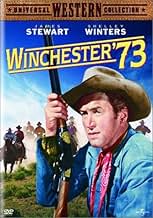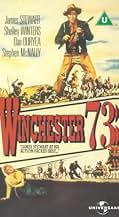NOTE IMDb
7,6/10
23 k
MA NOTE
Le trajet d'un fusil prisé d'un propriétaire malheureux à un autre et la poursuite d'un cow-boy meurtrier en cavale.Le trajet d'un fusil prisé d'un propriétaire malheureux à un autre et la poursuite d'un cow-boy meurtrier en cavale.Le trajet d'un fusil prisé d'un propriétaire malheureux à un autre et la poursuite d'un cow-boy meurtrier en cavale.
- Réalisation
- Scénario
- Casting principal
- Récompenses
- 1 victoire et 1 nomination au total
Tony Curtis
- Doan
- (as Anthony Curtis)
Victor Adamson
- Townsman
- (non crédité)
Robert Anderson
- Basset
- (non crédité)
Avis à la une
The prize rifle of a drifter (James Stewart) is stolen by his nemesis (Stephen McNally), apprehended by a gun-trader (John McIntire), involved in a cavalry vs. Indian clash, winds up in the hands of a man who struggles with cowardice (Charles Drake) before being swiped by a charismatic outlaw (Dan Duryea). Meanwhile Lin McAdam (Stewart) pursues it with his faithful pardner (Millard Mitchell).
While "Winchester '73" (1950) was shot in flat B&W, it's a compelling action-packed Western with noir touches highlighted by the notable cast, which also includes Will Geer and Shelly Winters (when she was young, fit and voluptuous, not to mention spunky). Also look for Rock Hudson as the lead brave Young Bull and Tony Curtis as a besieged cavalry trooper.
The movie throws in Dodge City, Kansas, and a surprisingly congenial, almost bumbling (and too-old) Wyatt Earp (Geer) even though it's clear that the film was shot in southern Arizona. For instance, the saguaro cactus is native to the Sonoran Desert and not within 800 miles of Dodge City. But Tascosa, Texas, works okay within the framework of the Southwest, I guess. Basically, you have to ignore some misleading geography and a dubious Wyatt Earp to enjoy the picture.
The film runs 1 hour, 32 minutes, and was shot mainly in southern Arizona with studio stuff done at Universal Studios, California, with some exterior shots of Zion National Park, Utah.
GRADE: B.
While "Winchester '73" (1950) was shot in flat B&W, it's a compelling action-packed Western with noir touches highlighted by the notable cast, which also includes Will Geer and Shelly Winters (when she was young, fit and voluptuous, not to mention spunky). Also look for Rock Hudson as the lead brave Young Bull and Tony Curtis as a besieged cavalry trooper.
The movie throws in Dodge City, Kansas, and a surprisingly congenial, almost bumbling (and too-old) Wyatt Earp (Geer) even though it's clear that the film was shot in southern Arizona. For instance, the saguaro cactus is native to the Sonoran Desert and not within 800 miles of Dodge City. But Tascosa, Texas, works okay within the framework of the Southwest, I guess. Basically, you have to ignore some misleading geography and a dubious Wyatt Earp to enjoy the picture.
The film runs 1 hour, 32 minutes, and was shot mainly in southern Arizona with studio stuff done at Universal Studios, California, with some exterior shots of Zion National Park, Utah.
GRADE: B.
For the viewer who comes upon it long after its making, "Winchester '73" has something in common with "Casablanca." While you watch it, you get this feeling that you're looking at a string of clichés encountered so often in the genre; then you realise that the clichés became clichés only after being copied from this particular film, and that they were so widely copied because this film was so great. In other words, it's a seminal work.
"Winchester '73" is a joy to watch. The broad lines of the plot are somewhat predictable, but mostly because you've seen them copied so many times in later movies, and nevertheless it still contains a number of twists which surprise you. The dialogue, the pacing and Mann's direction are excellent. Stewart shines in particular, and if you're a fan this is a "must-see," but he is not alone in delivering a good performance. Remarkably, many of the most thoughtful and/or witty lines go to minor characters. Because this makes these characters (much) more than cardboard cutouts, it lent additional realism to the film.
This is a remarkably underrated film, and well worth keeping an eye out for. The DVD also contains an interview with Stewart which provides some background on the film.
"Winchester '73" is a joy to watch. The broad lines of the plot are somewhat predictable, but mostly because you've seen them copied so many times in later movies, and nevertheless it still contains a number of twists which surprise you. The dialogue, the pacing and Mann's direction are excellent. Stewart shines in particular, and if you're a fan this is a "must-see," but he is not alone in delivering a good performance. Remarkably, many of the most thoughtful and/or witty lines go to minor characters. Because this makes these characters (much) more than cardboard cutouts, it lent additional realism to the film.
This is a remarkably underrated film, and well worth keeping an eye out for. The DVD also contains an interview with Stewart which provides some background on the film.
Buffs of the adult western that flourished in the 1950s try and trace its origins to the film that kicked off the syndrome. Of course, we can go back to Howard Hawks's Red River (1948) or further still to John Ford's My Darling Clementine (1946), but if we want to stick with this single decade, then it has to be one of a couple of films made in that era's initial year. One is "The Gunfighter," an exquisitely grim tale of a famed gunslinger (Ringo) facing his last shootout. Another from that same year is "Winchester '73," and it's worth noting that Millard Mitchell appears in both as grim, mustached, highly realistic range riders. In The Gunfighter, he's the town marshal expected to arrest Ringo but once rode with him in an outlaw gang. In Winchester, he's the sidekick to Jimmy Stewart, a kind of Horatio to Stewart's Hamlet in this epic/tragic tale. The plot is simple enough: Stewart's lonesome cowpoke wins a remarkable Winchester in a shooting match, beating the meanest man in the west (Stephen McNally), who is actually his own brother and caused the death of their father. When the brother steals the gun, Stewart and Mitchell go after him in a cowboy odyssey that takes them all across the frontier, meeting up with both outlaws and Indians. (In one wonderful bit, two future stars - Rock Hudson and Tony Curtis - play an Indian chief and a U.S. cavalry soldier - during a well staged pitched-battle. Dan Duryea steals the whole show as a giggling outlaw leader, while Shelly Winters, just before she began to gain weight, is fine as the shady lady who ties all the plots together. Today, filmmakers would go on for about four hours to bring such an ambitious idea to the screen, but Anthony Mann does so in an extremely economical amount of time, with not a minute wasted. Such western legends as Bat Masterson and Wyatt Earp (terrifically played by Will Geer) make brief appearances, adding to the historicity as well as the epic nature. The final battle between good and bad brothers, high atop a series of jutting rock canyons, is now legendary among western buffs. It's also worth noting that Stewart, however much associated he became with western films, does what is actually his first western leading man role here - yes, he was in Destry Rides Again eleven years earlier, but was cast in that comedy spoof because he seemed so WRONG for westerns!
One of the great Westerns, Winchester '73 is noteworthy film in many respects, not least because it marked the start of one of the great creative partnerships in the genre, that between director Anthony Mann and James Stewart. Mann had until this time been working successful in low budget films, crafting a series of B-noirs, which have a following on their own account today: titles such as T-Men (1947), Border Incident (1949) and Raw Deal (1948). 1950 brought his first big assignment with the current production, a film which many critics point to as marking the western's emergence into maturity during the decade.
It was also something of a career change for Stewart, whose many roles during his early career had been based around a friendly and frequently homespun persona. Only such films as the documentary noir Call Northside 777, of two years earlier, or odd moments during It's A Wonderful Life hinted at something darker, almost pathological, lurking beneath the amiable exterior. The series of Westerns made with Mann brought this something else to the surface; suddenly this was a dogged, vengeful Stewart, still playing honest men, but men who had often suffered a great wrong and were driven to put things right. (Hitchcock recognised this neurotic dimension to the actor as during the same period he also used him to great effect). Thus in The Man From Laramie (1955) the hero would have his livelihood burnt and be dragged behind a horse by a psychotic, while in Bend Of The River (1952) he is cast out to survive on his own from a wagon train.
As Lin McAdam in Winchester '73 he is already hunting someone who has wronged him: "...chasing him since I can't remember" and then, to add to it all, has a prize rifle stolen from him by his prey after an intense competition. The film focuses on the eponymous weapon as it passes through various hands and Stewart's parallel tracking of his human prey. In some ways his dogged perseverance reminds one of Ethan Edwards' in The Searchers (1956), where obsessive behaviour by a man searching for answers for matters as much internal as external also drives the plot.
McAdam's single-mindedness is a characteristic of many of Mann's Western heroes, a state of mind that approaches the unbalanced in The Naked Spur (1953). Of course McAdam is after getting back his rifle almost as much as he is after vengeance. Later films also feature the wandering weapon storyline - such as American Gun, or The Gun (1974) - the tale of a firearm passing through various hands provides a morality tale hedged around the prevalence of armaments. Winchester '73's central narrative thread has an entirely different purpose, one not generally concerned with social comment. When McAdam's gun is stolen the loss is seen in far more private, almost psychological terms, as if a piece of his personal honour is taken along with the rifle. In fact honour plays a large part in this film: it is either symbolically removed, as in the case of Dutch Henry Brown's early theft; much reduced as shown in the cowardice and subsequent humiliation of Charles Drake; or largely absent, as with the trader selling arms of questionable worth to the warring Indians. And of course besides McAdam's fury at the opening theft, what also drives him on is the dishonourable (because he's shot in the back by someone he trusted) loss of his father.
As critics such as Phil Hardy have noted, during the film McAdam encounters a series of potent father figures, such as Wyatt Earp, Sergeant Wilkes, and Lamont - the presence of who serves to echo and reinforce his own loss. To prove himself worthy of his late father in his own eyes, McAdams has to do is secure the something special he has lost and exact suitable vengeance. The look of the exhausted McAdam's face at the close of the film as he rejoins Lola (Shelley Winters) and his sidekick High Spade (Millard Mitchell) says it all.
In making Winchester '73, Mann was at last given the chance and the budget to make the most of his talents. His previous films had mostly been set amongst cramped and dangerous urban environments. Settling into a new genre he at once showed great response to landscape, and not just in the epic moments like the Indians' attack on Sergeant Wilkes' party. In many of his Westerns it is noticeable that the territory through which characters move is not just the geography of the west but also often a physical echo of the ongoing human drama, as exteriors reflect the emotional state of his characters. Thus at the start of the film we see McAdam moving through open vistas, before his first encounter set amidst the excited human clutter of Dodge. As events proceed, the landscape becomes more and more inhospitable until the film's climax fought out around and amidst bare rocks - a claustrophobic and harsh environment, aptly trapping the two adversaries in their uncompromising duel. Many traditional Westerns tended to save the psychological drama for interiors and the action, taken plain and simple, for outside. Mann's achievement was to resolve this pattern into something more subtle and expressive, opening the way for the deeper resonances in the genre which were to follow.
Winchester '73's plot, which involves several locations and a range of characters and events, could easily have proved episodic. Mann manages to draw all these elements together into a satisfying unity while still allowing the supporting actors to shine and do their thing. One standout is Dan Duryea, in an entirely characteristic performance as Waco Johnny Dean. Dean and Dutch Henry Brown (excellently done by the underrated Stephen McNally) provide excellent turns in villainy. There's a nice touch of symmetry too as the end draws near: McAdam, who had earlier been humiliated by Brown over a drink of milk back in Dodge, faces down Dean over another drink in the cantina.
The excellent DVD transfer shows the film in its best light, not least the splendid black and white photography. Mann rarely moves his camera, but instead shows mastery of composition within the frame and his direction of actors. The depth of focus benefits from the clear digital image, reproduced in the correct academy ratio. If this isn't enough to wet the appetite of any western fan, then there is an unmissable bonus. James Stewart recorded an interview commentary for the title when it appeared on laserdisc years back, and this is included - perhaps one of the very rare occasions that a representative of Hollywood's golden age appears in this way on a western DVD. (I can only otherwise think of Maureen O'Hara's commentary to the Region 1 special edition of Rio Grande.)
It was also something of a career change for Stewart, whose many roles during his early career had been based around a friendly and frequently homespun persona. Only such films as the documentary noir Call Northside 777, of two years earlier, or odd moments during It's A Wonderful Life hinted at something darker, almost pathological, lurking beneath the amiable exterior. The series of Westerns made with Mann brought this something else to the surface; suddenly this was a dogged, vengeful Stewart, still playing honest men, but men who had often suffered a great wrong and were driven to put things right. (Hitchcock recognised this neurotic dimension to the actor as during the same period he also used him to great effect). Thus in The Man From Laramie (1955) the hero would have his livelihood burnt and be dragged behind a horse by a psychotic, while in Bend Of The River (1952) he is cast out to survive on his own from a wagon train.
As Lin McAdam in Winchester '73 he is already hunting someone who has wronged him: "...chasing him since I can't remember" and then, to add to it all, has a prize rifle stolen from him by his prey after an intense competition. The film focuses on the eponymous weapon as it passes through various hands and Stewart's parallel tracking of his human prey. In some ways his dogged perseverance reminds one of Ethan Edwards' in The Searchers (1956), where obsessive behaviour by a man searching for answers for matters as much internal as external also drives the plot.
McAdam's single-mindedness is a characteristic of many of Mann's Western heroes, a state of mind that approaches the unbalanced in The Naked Spur (1953). Of course McAdam is after getting back his rifle almost as much as he is after vengeance. Later films also feature the wandering weapon storyline - such as American Gun, or The Gun (1974) - the tale of a firearm passing through various hands provides a morality tale hedged around the prevalence of armaments. Winchester '73's central narrative thread has an entirely different purpose, one not generally concerned with social comment. When McAdam's gun is stolen the loss is seen in far more private, almost psychological terms, as if a piece of his personal honour is taken along with the rifle. In fact honour plays a large part in this film: it is either symbolically removed, as in the case of Dutch Henry Brown's early theft; much reduced as shown in the cowardice and subsequent humiliation of Charles Drake; or largely absent, as with the trader selling arms of questionable worth to the warring Indians. And of course besides McAdam's fury at the opening theft, what also drives him on is the dishonourable (because he's shot in the back by someone he trusted) loss of his father.
As critics such as Phil Hardy have noted, during the film McAdam encounters a series of potent father figures, such as Wyatt Earp, Sergeant Wilkes, and Lamont - the presence of who serves to echo and reinforce his own loss. To prove himself worthy of his late father in his own eyes, McAdams has to do is secure the something special he has lost and exact suitable vengeance. The look of the exhausted McAdam's face at the close of the film as he rejoins Lola (Shelley Winters) and his sidekick High Spade (Millard Mitchell) says it all.
In making Winchester '73, Mann was at last given the chance and the budget to make the most of his talents. His previous films had mostly been set amongst cramped and dangerous urban environments. Settling into a new genre he at once showed great response to landscape, and not just in the epic moments like the Indians' attack on Sergeant Wilkes' party. In many of his Westerns it is noticeable that the territory through which characters move is not just the geography of the west but also often a physical echo of the ongoing human drama, as exteriors reflect the emotional state of his characters. Thus at the start of the film we see McAdam moving through open vistas, before his first encounter set amidst the excited human clutter of Dodge. As events proceed, the landscape becomes more and more inhospitable until the film's climax fought out around and amidst bare rocks - a claustrophobic and harsh environment, aptly trapping the two adversaries in their uncompromising duel. Many traditional Westerns tended to save the psychological drama for interiors and the action, taken plain and simple, for outside. Mann's achievement was to resolve this pattern into something more subtle and expressive, opening the way for the deeper resonances in the genre which were to follow.
Winchester '73's plot, which involves several locations and a range of characters and events, could easily have proved episodic. Mann manages to draw all these elements together into a satisfying unity while still allowing the supporting actors to shine and do their thing. One standout is Dan Duryea, in an entirely characteristic performance as Waco Johnny Dean. Dean and Dutch Henry Brown (excellently done by the underrated Stephen McNally) provide excellent turns in villainy. There's a nice touch of symmetry too as the end draws near: McAdam, who had earlier been humiliated by Brown over a drink of milk back in Dodge, faces down Dean over another drink in the cantina.
The excellent DVD transfer shows the film in its best light, not least the splendid black and white photography. Mann rarely moves his camera, but instead shows mastery of composition within the frame and his direction of actors. The depth of focus benefits from the clear digital image, reproduced in the correct academy ratio. If this isn't enough to wet the appetite of any western fan, then there is an unmissable bonus. James Stewart recorded an interview commentary for the title when it appeared on laserdisc years back, and this is included - perhaps one of the very rare occasions that a representative of Hollywood's golden age appears in this way on a western DVD. (I can only otherwise think of Maureen O'Hara's commentary to the Region 1 special edition of Rio Grande.)
The traditional Western is synonymous with wide open spaces, clearcut morality, inevitable storylines, the optimistic faith in a hero's ability to shape his own destiny, to escape his past. These qualities reflect directly the American sense of self, the self-shaping Dream, the pushing of boundaries and frontiers, which is why the genre is still alluded to by opportunistic politicians. With some noble exceptions (eg Wellman, Hawks), the Western was healthily free of neuroses or real anxiety. Anthony Mann changed all that forever, and this first foray into the genre is one of the most violent, vivid, complex, not to say exciting Westerns ever made.
The traditional Western depends on a hero who exemplifies rugged wholesomeness, whatever misfortunes he may have had in the past, a supporter of order and right, who dominates the film, removes its obstacles, restores harmony in effect; and an obvious villain, who often, ironically, drives the plot, forces the hero into certain actions. The difference between the two is often delineated as mythically simple as the wearing of white or black hats.
Mann's background was in film noir, a genre antithetical to wide open spaces and optimism. Noir was neurotically charged, focusing on the dissolution of an unstable protagonist, where morality is blurred, the hero is as often the villain, trapped in an interior-labyrinth of his own making, a passive victim to destiny. Noir is about regress not progress, the interrogating and denying of modes and signs of representation, not the creation and confirmation of them.
WINCHESTER 73 is fraught with noir anxiety. Noir is often considered a psychological genre, visualising the traumas of its protagonist's head. 73 does this too, and is all the more disturbing in that that protagonist is lovely, homespun Jimmy Stewart, initiating here his great run of difficult films with Mann and Hitchcock. In many ways, good-natured and sweet, representing right and trying to restore disruptions to the natural order, he is also a near-lunatic who will stop at nothing to achieve murderous revenge, whose relentless quest mirrors Ethan Edwards in THE SEARCHERS in its inhuman persistance, whose human instincts are frayed by this quest, and whose bursts of violence are genuinely terrifying to witness.
As in noir, his anxiety has a psychological base - unlike most 'healthy' heroes who have outgrown (symbolically killed) their fathers, McAdam's father was killed before he could complete the process; his chasing his brother is less moral revenge than an anguished protest against stunted growth. The climactic shoot-out is not cathartic: McAdam staggers back into 'normal' society, like he's just witnessed some of the world's most ghastly horrors.
What is most unsettling about the film is that it's not really about a hero or a villain at all, but an inanimate piece of weoponry that drives the action. 73 opens with the gun of the title privileged, on display behind a glass window, while its admirers are trapped, squashed, undifferentiated, framed, admiring it outside. Throughout the film, human power is reduced to the most arbitrary of signifiers - names change; Lin and Dutch mime shooting each other because they've no guns; quests lose their moral vitality and their practitioners veer close to madness; armies have to ask for help from Confederate strangers to fight battles; a man becomes worthy of respect only when he mentions his name; another man is revealed as a coward when he abandons his fiancee to the Indians; the gun retains its prestige, power, wholeness.
It's not the revenge plot which drives the film, but the story of the gun; this wrenches the film out of conventional expectations, and creates an eerie, alienating, modern feel. We become so caught up in the revenge plot that when we follow, with the gun, another plot entirely, we feel slightly bewildered.
This emphasis on the gun, symbol of potent masculinity, actually allows for a critique of that masculinity, revealing pointless elaborate rituals at the expense of society and order; brute capitalist greed; murderous Indian-traders who defraud both seller and enemy; cowards; psychotic killers; before returning to its 'true' owner, a broken hero thoroughly compromised, who has become as murderous as the murderer he seeks. The gun is never imprinted with the name of its owner, not only because there is no fixed owner, but because there is no fixed masculinity, an insight anathema to the traditional Western.
73 brilliantly invokes Western myths - Wyatt Earp, Dodge City, the Cavalry, the Civil War, the wide open West - only to undermine them. Earp has an inflated reputation that is all name but never proven - Dodge City is no safer against outlaws than anywhere else; the Cavalry is inept (Custer has just lost Little Big Horn) and the bitter feud of the War is shown to be irrelevant. The myth of the open West is a site for a very closed, inescapable, circular plot which traps its characters, refuses to allow them shape their destiny, but allowing it to shape them.
The old John Ford silhouette of riders on a vast mountain is reprised, but signals here not progress but repetition and circularity. But for all its deconstruction, the film is also tangibly vivid in a way few Westerns ever achieve. Mann's incisive technique intrudes his camera in crucial positions, alternating revealing distance with intense examination, making the saloon doors and stagecoaches seem thrillingly alive and lived in.
The traditional Western depends on a hero who exemplifies rugged wholesomeness, whatever misfortunes he may have had in the past, a supporter of order and right, who dominates the film, removes its obstacles, restores harmony in effect; and an obvious villain, who often, ironically, drives the plot, forces the hero into certain actions. The difference between the two is often delineated as mythically simple as the wearing of white or black hats.
Mann's background was in film noir, a genre antithetical to wide open spaces and optimism. Noir was neurotically charged, focusing on the dissolution of an unstable protagonist, where morality is blurred, the hero is as often the villain, trapped in an interior-labyrinth of his own making, a passive victim to destiny. Noir is about regress not progress, the interrogating and denying of modes and signs of representation, not the creation and confirmation of them.
WINCHESTER 73 is fraught with noir anxiety. Noir is often considered a psychological genre, visualising the traumas of its protagonist's head. 73 does this too, and is all the more disturbing in that that protagonist is lovely, homespun Jimmy Stewart, initiating here his great run of difficult films with Mann and Hitchcock. In many ways, good-natured and sweet, representing right and trying to restore disruptions to the natural order, he is also a near-lunatic who will stop at nothing to achieve murderous revenge, whose relentless quest mirrors Ethan Edwards in THE SEARCHERS in its inhuman persistance, whose human instincts are frayed by this quest, and whose bursts of violence are genuinely terrifying to witness.
As in noir, his anxiety has a psychological base - unlike most 'healthy' heroes who have outgrown (symbolically killed) their fathers, McAdam's father was killed before he could complete the process; his chasing his brother is less moral revenge than an anguished protest against stunted growth. The climactic shoot-out is not cathartic: McAdam staggers back into 'normal' society, like he's just witnessed some of the world's most ghastly horrors.
What is most unsettling about the film is that it's not really about a hero or a villain at all, but an inanimate piece of weoponry that drives the action. 73 opens with the gun of the title privileged, on display behind a glass window, while its admirers are trapped, squashed, undifferentiated, framed, admiring it outside. Throughout the film, human power is reduced to the most arbitrary of signifiers - names change; Lin and Dutch mime shooting each other because they've no guns; quests lose their moral vitality and their practitioners veer close to madness; armies have to ask for help from Confederate strangers to fight battles; a man becomes worthy of respect only when he mentions his name; another man is revealed as a coward when he abandons his fiancee to the Indians; the gun retains its prestige, power, wholeness.
It's not the revenge plot which drives the film, but the story of the gun; this wrenches the film out of conventional expectations, and creates an eerie, alienating, modern feel. We become so caught up in the revenge plot that when we follow, with the gun, another plot entirely, we feel slightly bewildered.
This emphasis on the gun, symbol of potent masculinity, actually allows for a critique of that masculinity, revealing pointless elaborate rituals at the expense of society and order; brute capitalist greed; murderous Indian-traders who defraud both seller and enemy; cowards; psychotic killers; before returning to its 'true' owner, a broken hero thoroughly compromised, who has become as murderous as the murderer he seeks. The gun is never imprinted with the name of its owner, not only because there is no fixed owner, but because there is no fixed masculinity, an insight anathema to the traditional Western.
73 brilliantly invokes Western myths - Wyatt Earp, Dodge City, the Cavalry, the Civil War, the wide open West - only to undermine them. Earp has an inflated reputation that is all name but never proven - Dodge City is no safer against outlaws than anywhere else; the Cavalry is inept (Custer has just lost Little Big Horn) and the bitter feud of the War is shown to be irrelevant. The myth of the open West is a site for a very closed, inescapable, circular plot which traps its characters, refuses to allow them shape their destiny, but allowing it to shape them.
The old John Ford silhouette of riders on a vast mountain is reprised, but signals here not progress but repetition and circularity. But for all its deconstruction, the film is also tangibly vivid in a way few Westerns ever achieve. Mann's incisive technique intrudes his camera in crucial positions, alternating revealing distance with intense examination, making the saloon doors and stagecoaches seem thrillingly alive and lived in.
Le saviez-vous
- AnecdotesJames Stewart credited this film with saving and redefining his career after a series of postwar flops threatened to seriously damage it.
- GaffesThis movie is based on a rifle-shooting competition held in Dodge City on 4 July 1876. During a poker game in the movie, Dutch refers to a "Dead Man's Hand". This refers to the poker hand 'Wild Bill' Hickok was holding when he was shot in the back by Jack McCall on 2 August 1876 - less than a month later. It was too soon for the "Dead Man's Hand" to be a famous phrase. However, per IMDb guidelines for Anachronisms, "a good deal of leeway" is allowed; linguistic anachronisms are usually excused (modern words in historical films) - "always bear in mind that it's entertainment not documentary."
- Citations
Wyatt Earp: That's Dutch Henry Brown. I thought you said you didn't know him.
Lin McAdam: I said I didn't recall the name.
- Crédits fousThe film's opening prologue states: This is a story of the Winchester Rifle Model 1873 "The gun that won the West" To cowman, outlaw, peace officer or soldier, the Winchester '73 was a treasured possession. An Indian would sell his soul to own one . . .
- ConnexionsFeatured in MacArthur, le général rebelle (1977)
Meilleurs choix
Connectez-vous pour évaluer et suivre la liste de favoris afin de recevoir des recommandations personnalisées
- How long is Winchester '73?Alimenté par Alexa
Détails
- Date de sortie
- Pays d’origine
- Site officiel
- Langue
- Aussi connu sous le nom de
- Winchester '73
- Lieux de tournage
- Société de production
- Voir plus de crédits d'entreprise sur IMDbPro
- Durée1 heure 32 minutes
- Couleur
- Rapport de forme
- 1.37 : 1
Contribuer à cette page
Suggérer une modification ou ajouter du contenu manquant

Lacune principale
By what name was Winchester 73 (1950) officially released in India in English?
Répondre
